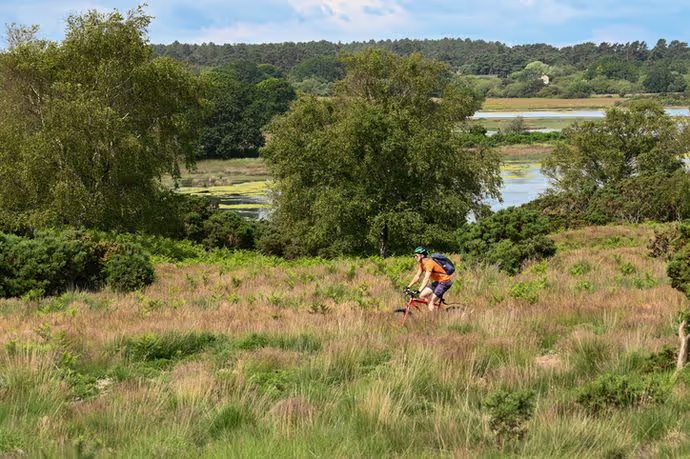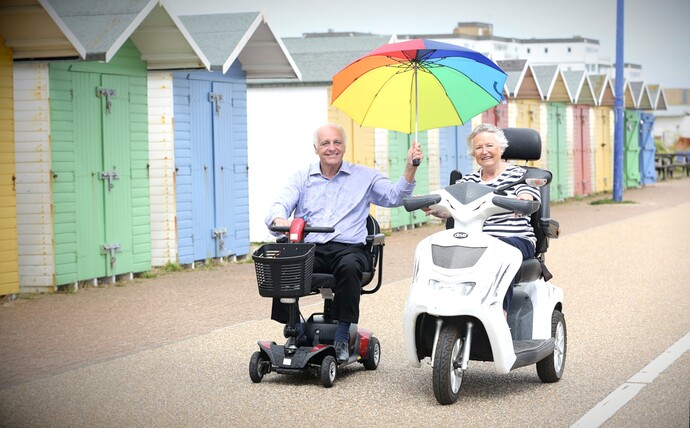How lack of countryside access prevents rambling, wheeling and bikepacking
March 11, 2025

Thousands of beauty spots across England are supposedly designated for public enjoyment, yet you can't access them legally unless you own the surrounding land. For walkers, wheelchair users, and bikepackers alike, Britain’s countryside is not as open as it should be, despite overwhelming public support for greater access to nature.
Every hiker knows the frustration of trying to follow a footpath that vanishes into thin air - unmarked, blocked, or simply cut off by private land. In England and Wales, there are a staggering 32,000 cases of obstructed public rights of way, whether by fences, overgrown vegetation, or deliberate landowner interference. For cyclists and wheelchair users, the problem is even worse, with too few accessible trails and a legal framework that prioritises landowners over people who just want to experience nature.
{{cta-cycling}}
Despite the Countryside and Rights of Way Act (CRoW) of 2000, which granted some access to open land, just 8% of England is legally accessible. By contrast, Scotland’s “right of responsible access” means almost all of its landscape is open to those who respect it. Yet in England, landowners still have a stranglehold over who can enjoy the countryside and how.
The problem isn’t just the blocked paths - it’s the outright lack of legal access to many beautiful places. Across the South Downs alone, 11 areas with a so-called “right to roam” are unreachable without trespassing. It’s the same story for cyclists looking to explore beyond busy roads or wheelchair users seeking smooth, traffic-free routes. The infrastructure for truly inclusive outdoor access remains woefully inadequate.

When post-Brexit farming subsidies were reformed in 2018, there were no meaningful provisions to open up more land for public enjoyment.
Extending the right to roam beyond open moorland to include woodlands, riversides, and more cycle-friendly bridleways would be a win for both public health and local economies. Walking and cycling tourism bring millions to rural areas each year, yet outdated access laws restrict these benefits to too few places.
A fundamental shift in land access policy is needed to break down barriers and allow more people to walk, wheel, and ride through Britain’s countryside. Whether it’s rambling, bikepacking, or simply seeking a quiet green space, access to the countryside is a public good that should be protected and expanded.
The government must act to close the absurd gaps in the right to roam, strengthen protections for public paths, and ensure that all who wish to enjoy the countryside—on foot, by bike, or by mobility aid—are free to do so without fear of trespassing. If Scotland can do it, why can’t England?
Cycle Rescue for free with ETA bicycle insurance
If you suffer a breakdown (including punctures, or even a flat e-bike battery) while out cycling, our 24-hour Cycle Rescue team is on hand to arrange transport for you and your bicycle to a safe location. The service is included for free with ETA cycle insurance, along with:
• Theft, accidental damage & vandalism
• E-bike battery theft cover
• Cycle Rescue
• No devaluation of your bike over time
• £2m third party PLUS £20,000 personal accident cover
• Shed and garage storage
• Low standard excess of 5% (£50 minimum)

{{cta-cycling}}
The ethical choice
The ETA was established in 1990 as an ethical provider of green, reliable travel services. Over 30 years on, we continue to offer cycle insurance , breakdown cover and mobility scooter insurance while putting concern for the environment at the heart of all we do.
The Good Shopping Guide judges us to be the UK's most ethical provider.
Information correct at time of publication.







